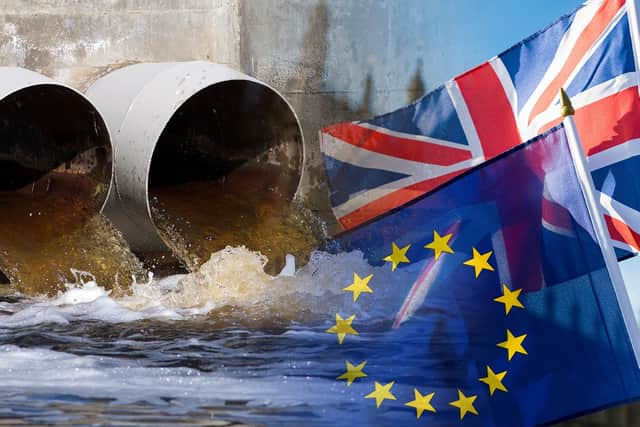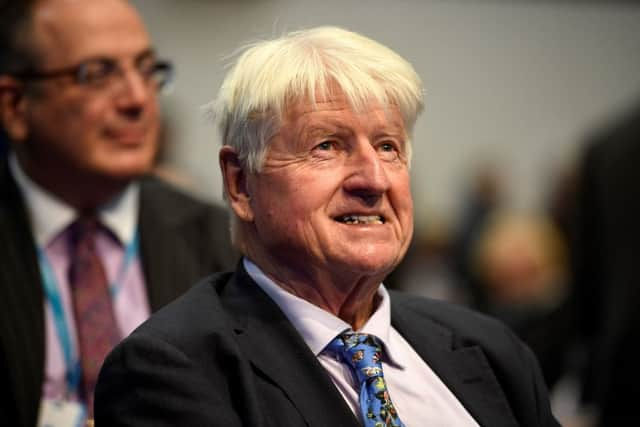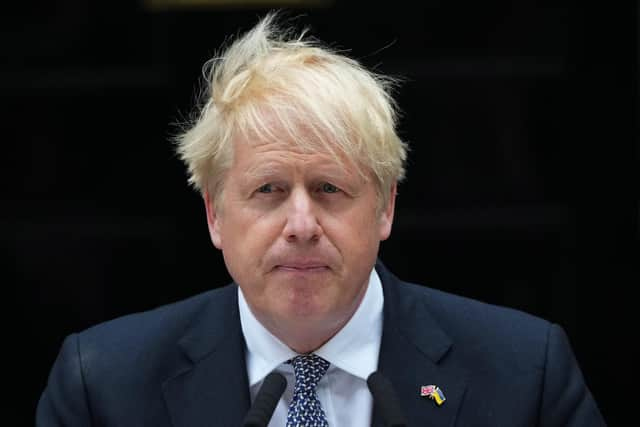How has Brexit impacted sewage being discharged in the UK? Changes to regulations - what Stanley Johnson said
and live on Freeview channel 276
Stanley Johnson, the Prime Minister’s father, has blamed Brexit for the UK’s current sewage problem.
Speaking to LBC host Rachel Johnson, the PM’s sister, Mr Johnson said it was down to his son’s government for the staggering amount of sewage being pumped into Britain’s waters.
Advertisement
Hide AdAdvertisement
Hide AdThe 82-year-old suggested that Brexit caused Boris Johnson’s administration to feel “not able to push” to stop pollution as strongly as it might have if the UK was still part of the EU.
He said Britain faces “a long slog” now that he doesn’t have “the backing which the EU framework gave”, and suggested Britain must now “build a new union within the wider European network”.


Has Brexit impacted sewage being discharged?
The Prime Minister’s father recalled how “Britain was known as the dirty man of Europe” before it joined what is now known as the European Union in 1973 - due to the lack of statistical measurement of water quality at UK beaches.
He told LBC that European regulations during that period “transformed the quality of bathing water around the whole of Europe” and the UK “really did get a cleanup”.
Advertisement
Hide AdAdvertisement
Hide AdBut now the UK has left the EU, Mr Johnson said he suspects “that we are now in a very, very difficult and dangerous situation.”
He said while “some of the EU legislation was carried over” and should “in theory” be in effect, “without the backing which the EU framework gave ... we face a long slog”.


He added: “I’m talking particularly about the backing of the European Commission, the European court, and the fact that people were ready to take the government to court for not insisting that these standards are upheld.
“Bring back, for example, the statistical measurements.
“We haven’t measured water quality on our beaches for three or four years now. It’s a shocking state of affairs.”
Advertisement
Hide AdAdvertisement
Hide AdMr Johnson said that although “we’ve finished with Brexit”, ministers “absolutely need to build a new union within the wider European network”.
On the LBC show his daughter pressed him on who is to blame for the sewage situation.


Mr Johnson replied: “I would say we have to blame the government for not pressing this matter as hard as it should have done, and of course absent the EU push as well you can understand how the government has felt able to not push this thing as it should have pushed.
“We do have the amendment now ... but what I would like to see is for Britain to go back – not go back obviously into the EU – but at least go back into an agency which gives us the statistical evidence.”
Advertisement
Hide AdAdvertisement
Hide AdHe added: “It’s not just sewage which goes into our seas and rivers.
“It’s all sorts of things. And you have to have a general framework of water management, and that was one thing which flowed well from the EU directives.”


How did regulations on sewage discharge change?
Regulations over the process of dumping sewage into the sea changed in 2021.
Towards the end of last year, some businesses found it more difficult to get hold of water treatment chemicals because of supply chain disruption at ports - blamed primarily on Britain’s departure from the EU.
Advertisement
Hide AdAdvertisement
Hide AdBecause of this the Environment Agency said companies struggling to get hold of the required chemicals would be allowed to "discharge effluent without meeting the conditions" of their permits, which normally require water to be treated by a multi-step process.
Amelia Womack, deputy leader of the Greens, told The Independent at the time: "Our rivers are already appallingly polluted: water companies discharged raw sewage in UK rivers no fewer than 400,000 times last year.
"The public were rightly horrified by this failure of the Environment Agency to take action and clean up our waterways.”
While the UK was part of the EU, the bloc had established two main legal frameworks for the protection and management of freshwater and marine resources.
Advertisement
Hide AdAdvertisement
Hide AdThe EU Water Framework Directive aims to prevent and reduce pollution, promote sustainable water use, protect and improve the aquatic environment and mitigate the effects of floods and droughts.
Member states are requested to draw up so-called river basin management plans to achieve good environmental status for all waters.
Meanwhile the urban waste water treatment directive introduced controls on the disposal of sewage and required water companies to phase out dumping sewage in the sea.
This regulation is still in place for members of the EU, but ceased to apply to the UK after it left the trading bloc.
Advertisement
Hide AdAdvertisement
Hide AdWhat has been revealed about sewage discharge in the UK?
Ministers have come under increasing pressure to halt the routine pollution.
Dozens of pollution warnings were put in place this week at beaches and swimming spots across the UK after heavy rain overwhelmed sewer systems.
This led water firms to release sewage into the natural environment.
Environment Agency figures published suggested there had been a 27-fold increase in untreated sewage discharges into rivers and seas over the last five years.
Advertisement
Hide AdAdvertisement
Hide AdThe figures, obtained by Labour via Freedom of Information requests, showed raw sewage has been pumped into UK waterways for a total of 9,427,355 hours since 2016.
Meanwhile Lib Dem analysis of the agency’s data found nearly one in four UK sewage discharges went unmonitored last year.
It also found that 1,802 monitors installed by water companies were not working for at least 90% of the time, and there was a complete absence of monitors during 1,717 storm overflows.
Comment Guidelines
National World encourages reader discussion on our stories. User feedback, insights and back-and-forth exchanges add a rich layer of context to reporting. Please review our Community Guidelines before commenting.
